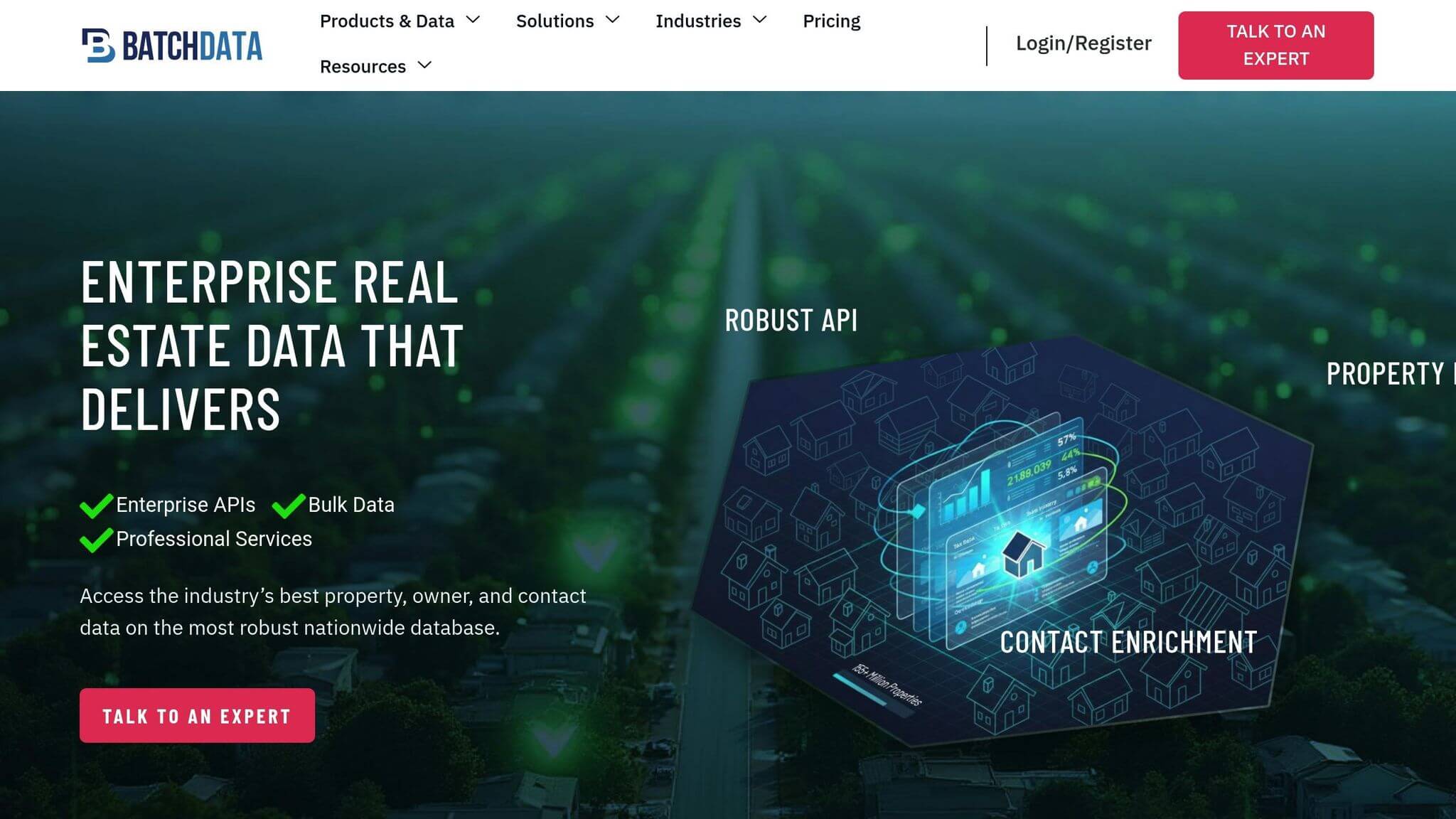Integrating property search APIs into CRMs transforms real estate workflows. These APIs automate tasks like data collection, improve accuracy, and provide instant property insights, such as valuation, ownership history, and market trends – all within your CRM. This eliminates data silos, boosts efficiency, and enables better decision-making.
When choosing a property search API for your CRM, focus on these key factors:
- Data Quality: Ensure extensive, up-to-date coverage across U.S. markets with verified property and contact details.
- Reliability: Look for APIs with high uptime, fast response times, and clear documentation for smooth integration.
- Pricing Options: Choose flexible plans (pay-as-you-go or tiered subscriptions) that match your business needs.
- Compliance: Verify adherence to U.S. privacy laws like CCPA and secure data handling practices.
BatchData’s API stands out by offering detailed property data, contact enrichment, bulk data delivery, and phone verification. With tiered pricing starting at $500/month, it caters to businesses of all sizes, providing tools to streamline CRM workflows and improve lead generation.
For implementation, follow these steps:
- Configure API authentication and map data to your CRM fields.
- Test with sample data to ensure accurate integration.
- Monitor performance, optimize API usage, and measure ROI through metrics like lead quality, efficiency gains, and revenue impact.
What Is API Used For In Real Estate? – CountyOffice.org

What to Look for in Property Search APIs for CRM Integration
Selecting the right property search API for your CRM is a crucial step in ensuring smooth operations, data accuracy, and regulatory compliance. A poorly chosen API can disrupt workflows and impact your real estate business. Here’s what to focus on when evaluating your options.
Data Coverage and Accuracy
A reliable property search API should provide extensive coverage across U.S. markets, including both urban hubs and rural areas. Look for data sourced from trusted entities like county assessor offices and multiple listing services to ensure thoroughness.
Since property details can change frequently – whether it’s a new listing, a price adjustment, or an ownership update – the API must refresh its data regularly. This ensures your CRM always reflects the most current property values and ownership information.
Verified contact details are another key aspect, as they enhance lead generation and outreach efforts. Top-tier providers will offer clear standards for data accuracy, transparent quality reports, and mechanisms to address inaccuracies. These features ensure your CRM integration remains dependable and effective.
API Reliability and Documentation
Your CRM’s performance heavily depends on the reliability of the API it integrates with. APIs that experience slow response times, frequent downtime, or other performance issues can lead to outdated data and frustrated users.
To avoid these pitfalls, choose a provider that guarantees high uptime through clear service level agreements (SLAs) and demonstrates consistent, fast response times – even under heavy use.
Equally important is the quality of the API documentation. Comprehensive documentation should include detailed endpoint descriptions, examples of requests and responses, explanations of error codes, and sample code in various programming languages. Well-maintained and easy-to-navigate documentation simplifies integration and troubleshooting, allowing your development team to work efficiently. A dependable API not only enhances your CRM’s functionality but also supports informed, data-driven decisions.
Pricing Models and Flexibility
Different businesses have different needs, and property search APIs often offer pricing models to match. Pay-as-you-go plans are ideal for businesses with varying search volumes, while tiered subscriptions provide consistent costs for those with high usage.
For larger organizations, custom plans with dedicated support and tailored SLAs may be more suitable. Regardless of the pricing model, transparency is key – ensure the provider clearly outlines all costs and avoids hidden fees.
Compliance with U.S. Data Privacy Standards
Compliance with data privacy regulations is non-negotiable. Any API you integrate must align with U.S. privacy laws, such as the California Consumer Privacy Act (CCPA) and other state-level regulations governing personal data.
To meet these requirements, the API should use encrypted data transmission, secure authentication protocols, and have clear policies for data retention. Features like audit trails and logging capabilities further ensure compliance and prepare your organization to handle potential security challenges effectively.
BatchData‘s Property Search API Overview

BatchData positions itself as a leading provider of real estate data, with a strong emphasis on seamless CRM integration. Designed for real estate professionals, the platform offers advanced property search tools, contact enrichment, and professional data services to streamline workflows and enhance efficiency.
By delivering accurate data that integrates effortlessly with existing CRM systems, BatchData tackles key challenges faced by real estate teams. This makes it an essential tool for those looking to improve their property search and lead generation processes.
Features and Benefits
BatchData’s Property Search API comes packed with features tailored to simplify and enhance CRM workflows:
- Comprehensive Property Data Enrichment: Beyond basic listings, the platform provides detailed insights such as property characteristics, ownership history, and valuation data.
- Contact Enrichment and Skip Tracing: Verified owner contact information is automatically extracted, eliminating the need for manual research and speeding up lead generation.
- Phone Number Verification: Real-time validation ensures contact data is up-to-date and actionable, reducing outreach inefficiencies by flagging outdated numbers directly within CRM systems.
- Bulk Data Delivery: Handle large-scale imports of property data without performance issues, even during peak usage. The platform processes thousands of records efficiently and consistently.
- Professional Services: BatchData offers tailored services like custom data pipeline development, consulting for data enrichment, and support for go-to-market strategies, helping businesses optimize their CRM integration.
Pricing Structure
BatchData uses a tiered monthly subscription model with pricing designed to suit businesses of all sizes. Here’s a quick breakdown:
| Plan | Monthly Cost | Property Records | Best For |
|---|---|---|---|
| Lite | $500 | 20,000 records | Small teams and startups |
| Growth | $1,000 | 100,000 records | Growing real estate businesses |
| Professional | $2,500 | 300,000 records | Established agencies |
| Scale | $5,000 | 750,000 records | Large operations |
| Enterprise | Custom pricing | Custom volumes | Enterprise-level needs |
All plans require an annual commitment with monthly billing. Additionally, businesses can purchase add-on datasets that scale with their base plan. For example, the Listing add-on starts at $150/month for Lite plans and goes up to $3,000/month for Enterprise plans.
For companies with unpredictable usage, BatchData offers pay-per-match skip tracing without requiring a subscription. Pricing for API calls ranges from $0.01 per match to annual packages costing up to $10,200.
To mitigate integration risks, BatchData provides free samples, allowing businesses to test data quality before committing. This ensures teams can validate that the data aligns with their specific needs.
CRM Integration Use Cases
BatchData’s features integrate seamlessly into CRM workflows, unlocking a range of practical applications:
- Automated Lead Qualification: Property search results can include owner contact details and valuation data, helping CRM systems prioritize high-value prospects for outreach.
- Client Profile Enrichment: Leads entering the CRM with minimal data can be automatically enriched with property holdings, ownership history, and demographic details. This allows for more targeted marketing and personalized interactions.
- Property Portfolio Tracking: Bulk data delivery enables real estate professionals to monitor specific neighborhoods or property types. Automatic updates notify teams of ownership changes, new listings, or significant shifts in property values.
- Phone Verification Integration: The platform flags disconnected numbers and suggests alternative contact methods, reducing wasted effort on invalid leads and improving outreach success rates.
- Custom Data Pipelines: Teams can configure automatic imports of specific property types or locations. For example, a commercial real estate team might sync all industrial properties over 10,000 square feet in their target markets, ensuring their CRM is always current.
BatchData’s Property Search API empowers real estate teams to work smarter, streamline their processes, and make the most of their CRM systems. Whether it’s automating lead qualification or enriching client profiles, the platform delivers tools that drive efficiency and results.
sbb-itb-8058745
How to Implement Property Search APIs in CRMs
Bringing property search APIs into your CRM system takes careful planning and execution. The goal is to ensure smooth data flow and reliable performance while meeting all compliance requirements. Here’s a breakdown of the process.
Integration Steps
Start with API authentication and configuration. Property search APIs typically use token-based authentication, so you’ll need to securely store these tokens within your CRM. Set up the API endpoints and configure authentication credentials to align with your CRM’s security standards.
Next is data mapping, where you decide how property data will populate your CRM fields. For example, you’ll need to map property addresses, owner details, and valuation data into the right CRM locations. Keep in mind that the API’s data format might differ from your CRM’s structure, so adjustments may be necessary.
The third step is testing and validation. Use small data samples to ensure the API is transferring data correctly and triggering workflows as expected. Test for scenarios like successful matches, partial results, and error handling to catch any issues before full deployment.
Finally, move to deployment and monitoring. Roll out the API to a limited group of users first, and keep an eye on data quality, response times, and system performance. This initial phase is key to identifying and fixing any problems early on.
Data Accuracy and Compliance
To maintain data accuracy, set up validation rules in your CRM to flag incomplete entries and verify address formats. Regular audits can uncover patterns in data quality issues, helping you refine your integration.
Compliance is another critical piece. U.S. privacy laws like the Fair Credit Reporting Act (FCRA) regulate how you use consumer information, especially for activities like tenant screening or background checks. Similarly, the Telephone Consumer Protection Act (TCPA) governs how you can use phone numbers for marketing.
State-specific laws, such as California’s Consumer Privacy Act (CCPA), may also affect how you handle property owner data. Make sure your CRM includes data retention policies to automatically delete outdated records and tools to handle data subject requests.
Documentation is essential for compliance audits. Keep detailed records of your data sources, how you process information, and any consent mechanisms. This will be invaluable during regulatory reviews or when addressing consumer inquiries.
API Performance Optimization
Once the API is integrated, focus on improving its performance. Start by reducing payload sizes to speed up response times. Use data compression methods like Gzip or Deflate to minimize file sizes, and make sure your API requests only pull the specific data fields your CRM workflows need.
For network optimization, consider running API calls on separate threads to prevent them from slowing down other CRM processes. If your team operates in multiple locations, using a Content Delivery Network (CDN) can improve request processing times.
Rate limiting and caching are also important. Rate limiting avoids duplicate requests, while caching stores frequently accessed property data to reduce server load and latency. Since property data doesn’t change often, you can cache it for several hours without issue.
Finally, use pagination strategies to handle large datasets efficiently. Instead of requesting thousands of records in one go, break them into smaller batches. This reduces memory usage and prevents system timeouts during bulk data imports.
Measuring ROI
Once your integration is running smoothly, measure its ROI using clear metrics.
- Lead quality metrics: Track how many property search leads convert into qualified prospects compared to leads from other sources. Also, monitor how much time automated contact enrichment saves in identifying and contacting leads.
- Operational efficiency: Measure productivity gains, such as the reduction in manual research time per lead or the increase in daily lead processing capacity.
- Revenue impact: Look at key performance indicators like average deal size and sales cycle length to see how the integration affects your bottom line.
- Cost analysis: Compare monthly API subscription fees to the cost of manual research, factoring in team hourly rates. Also, consider the savings from improved data accuracy, which can reduce wasted outreach and boost conversions.
Set up automated reporting within your CRM to track these metrics regularly. Monthly reports can help you evaluate the API’s value and identify areas for improvement. Most implementations start showing measurable results within 60 to 90 days of full deployment.
Conclusion
Property search APIs have become a game-changer for real estate professionals looking to simplify CRM workflows and boost growth. These tools make it easier to enrich contact records, verify property details, and integrate detailed property data, reshaping how teams handle lead generation and manage client relationships.
However, successful implementation requires attention to key factors like data accuracy, compliance with regulations, and optimizing performance. When done right, these APIs can significantly enhance lead quality, streamline operations, and drive revenue growth.
Among the many options available, BatchData stands out. Its property search API offers a wide range of features, including property and contact enrichment, skip tracing, phone verification, and bulk data delivery. The pay-as-you-go pricing model ensures teams only pay for what they use, making it a scalable option for businesses of all sizes.
What’s more, BatchData’s developer-friendly setup and professional services make custom integrations seamless. Whether you need basic property search capabilities or specialized datasets tailored to niche markets, BatchData’s solutions are designed to meet the unique demands of your business.
In today’s competitive real estate landscape, having access to reliable and accurate data is a must. Combining precise data enrichment with flexible integration and compliance gives real estate teams the edge they need to succeed in a fast-paced market.
FAQs
What are the main advantages of using property search APIs in CRM systems for real estate professionals?
Integrating property search APIs into CRM systems can transform how real estate professionals manage their operations. By automating data transfers, these APIs reduce the need for manual input, minimizing errors and saving time. Plus, they allow for system customization, ensuring the CRM aligns perfectly with specific business needs.
Beyond efficiency, these APIs provide access to rich property data, market trends, and insights. This empowers agents and brokers to make informed decisions, offer enhanced client experiences, and stay ahead in a competitive market.
How can I make sure the property search API I use follows U.S. data privacy laws like CCPA?
To ensure the property search API you select aligns with U.S. data privacy laws, such as the California Consumer Privacy Act (CCPA), prioritize transparency, respect for consumer rights, and secure data handling. Look for an API provider that clearly outlines its privacy policies, allows consumers to access or delete their personal data, and provides options for users to opt out of data sharing.
Make sure the API processes data in line with legal standards. For example, it should use deidentified or aggregated data whenever possible to minimize privacy risks. Familiarize yourself with key CCPA requirements, like obtaining explicit consent before selling personal information, to avoid compliance issues. Consulting legal or compliance experts is always a smart move to ensure your integration stays within regulatory boundaries.
How can I successfully integrate a property search API into my CRM system?
To integrate a property search API into your CRM effectively, begin by selecting an API that offers rich property details, adaptable filtering options, and dependable market insights. Make sure the API matches your business requirements and is compatible with your CRM platform.
When integrating, prioritize best practices like using secure authentication methods (such as API keys), following RESTful API standards, and thoroughly testing for performance, scalability, and data accuracy. These steps help ensure the integration runs seamlessly.
Lastly, establish a routine maintenance plan to keep the API updated and functioning smoothly as your system grows and changes.



